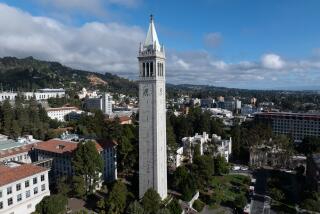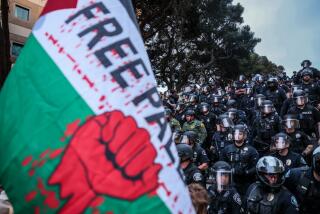Arms-Control Class Teaches Peacemaking Nuts and Bolts
In a conference room in the Russian Library on the UC Irvine campus, would-be negotiators for the United States and the Soviet Union sat across the table from each other recently and signed an arms-control treaty.
The negotiators were actually students of Prof. Keith Nelson, and they were learning about the nuts and bolts of world peace. They played their roles with utmost seriousness and were judged by experts in the field, some of whom actually have sat across from the Soviets at the table in Geneva.
“That was the best class I took at UCI,” said Sharon Starkey, 21, one of Nelson’s students last year. “I think the class is unique. Students who have been reading about arms-control negotiations in books actually get a chance to get a little closer feel for what it’s actually like.”
The arms-control class is part of the interdisciplinary Global Peace and Conflict Studies program at UC Irvine. Each year Nelson, director of the program, takes 10 to 20 of the top students majoring in political science, history and economics and divides them into two teams, one Soviet and one American, and asks them to negotiate arms treaties.
The students “master the field and meet at all hours,” Nelson said. When a treaty has finally been agreed to, outside experts play the role of the Politburo and the Senate Foreign Relations Committee and grill the amateur diplomats about the deal they have struck.
The idea for the Global Peace and Conflict Studies program was born in the early 1980s when the United States and the Soviet Union were at loggerheads. The Soviet Union was the “evil empire,” the nuclear-freeze movement and Jonathan Schell’s best-selling book “The Fate of the Earth” were the subject of national discussion and the fear of nuclear annihilation was palpable.
In a post-Cold War world in which the United States seems more threatened by economic competition from its allies than nuclear annihilation by the Soviet Union, the field of peace and conflict studies is in flux.
“The possible has greatly expanded . . . the field is very much in business, but in a different way,” said David Bernstein, assistant to the directors of the Center for International Security and Arms Control at Stanford University.
Reflect New Climate
In this new climate, the goal of programs such as UC Irvine’s must be to stimulate thinking about a world in which the United States and the Soviet Union increasingly share power with Western Europe, Japan and China, said Julius Margolis, former director of the peace program at UC Irvine.
An important strength of the program, Nelson said, is that it combines peace and conflict studies under one umbrella. Within the field there is something of an ideological rift between conflict-and-security scholars who view “world power and conflict primarily in military terms” and peace-studies scholars who have a “strong aversion to war and violence.”
The program tries to “maintain a dialogue between the two groups,” said Nelson, a history professor who has taught at UC Irvine since classes began in 1964.
Other colleges and universities also offer peace studies programs. But Margolis said the UC Irvine undergraduate program is “by far the most successful in the University of California system.”
In the program, said Robby Morow, 21, “I can take a variety of subjects from physics to Russian history, foreign language to international law.”
Private donors have endowed three chairs for the program, at $300,000 apiece, which will enable the university to add eminent scholars to the permanent faculty. Part of the program’s goal, Nelson said, is to “build a world-class research unit.”
“A number of distinguished people around the country have expressed interest in the chairs,” Nelson said. When the chairs are filled, “UCI will get national attention.”
Thomas Tierney of Newport Beach, who with his wife, Elizabeth, contributed $100,000 for a chair in Peace Research, said, “I am impressed with the diligence and thoroughness and rigor of the (selection) process. . . . They are doing it right.”
The second chair, endowed by Clifford and Elaine Heinz of Newport Beach, will focus on economics. The third, endowed by Robert and Lori Warmington of Newport Beach, will be on international cooperation on the issues of environmental quality, human development and health. The Warmington chair is awaiting approval by the UC Regents.
More to Read
Sign up for Essential California
The most important California stories and recommendations in your inbox every morning.
You may occasionally receive promotional content from the Los Angeles Times.










